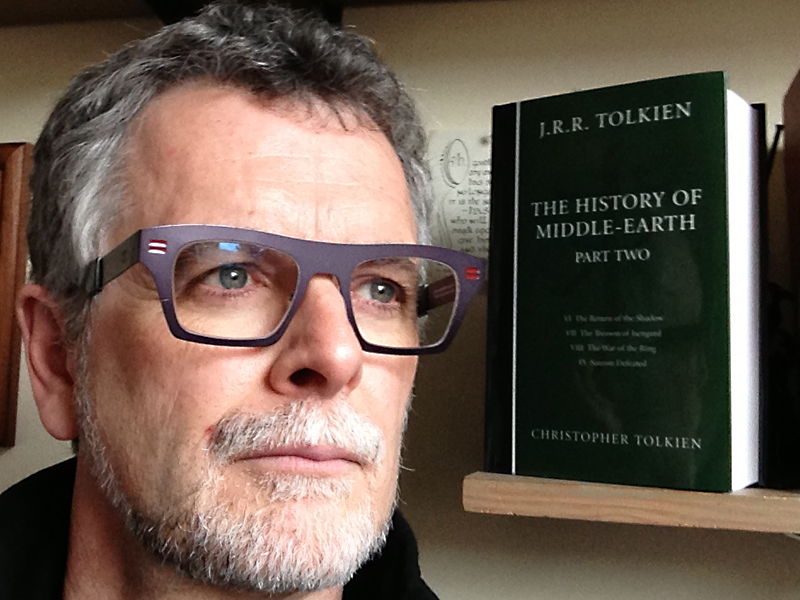Two UVic courses turn to Tolkien’s world in time for new Hobbit movie
- Tara Sharpe

The opening date for screening the first installment of Peter Jackson's new Hobbit trilogy is Dec. 14, including in Victoria. Two new courses in UVic's Faculty of Humanities take a closer look at Lord of the Rings, Middle-earth and the imaginative world and languages crafted decades ago by British linguist, writer and Oxford professor J.R.R. Tolkien.
The Created Medieval History of J.R.R. Tolkien's Middle-earth (HIST 380A)
UVic history professor Dr. Tim Haskett says this course will be "radically unlike anything" he's taught before. The Spring 2013 course will explore Tolkien's full body of work including The Silmarillion and The Unfinished Tales, mere weeks after merry-making hobbits, a wise wizard and one very "precious" ring again fill film screens.
Haskett won't be using The Hobbit, or There and Back Again (1937), first published by Tolkien as a children's book. Instead, Haskett will not only focus on the LOTR narrative (originally published in the mid '50s), but will also delve into a time before Elves and men. The Jackson films suggest a once-understood history has drifted into legend, then myth. There are plenty of legends, but nothing is lost: Tolkien built a tangibly recorded history based on what he knew as a medieval scholar.
Haskett, himself a medievalist who has taught at UVic for 23 years, will approach the writings as a single coherent record-just as with any undergraduate historicist approach. A review of medieval history would include law, art, literature and society: "It's all grist for the mill in the historical enterprise."
Jackson had "of necessity to jettison most of the stuff that touches on the historical qualities," says Haskett. "This course is going to be a great experiment."
The class will move chronologically up to the War of the Ring, and then "everyone will be in a position of having a fine understanding of tens of thousands of years of this created history. They can say, 'I understand why this person says this.'"
"Tolkien's world is a creation, to be sure, but its record has to be approached as a real history if it is to make sense."
He hopes the course will inspire those enamoured of the trilogy or films (or both), and those on the brink of recognizing Tolkien's remarkable achievement.
Haskett is a Jackson fan too: "If he needs another screenwriter, I'm still available!"
Alien Languages (LING 297)
Tolkien invented numerous languages, arranging sounds and meanings like an exceptionally talented composer filling musical staves with unique sounds.
A new course, taught in Fall 2012 by Dr. Martha McGinnis-Archibald (linguistics), reviews fictional languages-including Star Trek's Klingon and Tolkien's Sindarin-and how they respect or defy the constraints of human language.
"There is a tendency to think 'anything goes,'" McGinnis-Archibald says. "But that's not true." She believes "the fictional element helps support creativity. A real challenge for students is to sufficiently master university material to spontaneously wield it on their own." This approach brings knowledge alive.
She draws a distinction between human-like languages ("An infant could acquire Elvish") and completely alien languages like Eunoia, created by experimental poet Christian Bök, which has no verbs or subjects.
Tolkien based his Elvish languages closely on Welsh. The Star Trek III producer tasked linguist Marc Okrand with developing the Klingon language, which takes many of its features from Indigenous languages of the Americas.
The students use Okrand's Klingon Dictionary and Mark Rosenfelder's The Language Construction Kit as primary texts.
McGinnis-Archibald acknowledges the course is partly constrained by source material, but points out fans are "very serious" about the languages. "There is even a journal of the Elvish Linguistic Fellowship."
She says she is "more of a consumer than an expert" of Elvish languages but clarifies linguists aren't necessarily polyglots: "We study languages like scientists study bees; it doesn't mean scientists fly like bees." Regardless, she is game to give samples when asked how 'unreal' languages might really be.
"I cannot speak Klingon" is tlhIngan Hol vIjatlhlaHbe'. The phrase is roughly pronounced TLING-an khol vi-JATL-lakh-BEY, according to Okrand's dictionary. And in Eunoia, the expression [s]ina&u#168;i [e]uhu[r]a means both "We come in peace" and "We come in furor." The phrase is pronounced shee-nha-wheeee, yhoo-hurrr-rha with a trilled "r" and breathy vowels.
Don't expect her to order popcorn in Sindarin but, like Haskett, McGinnis-Archibald will be in line for the new movie.


